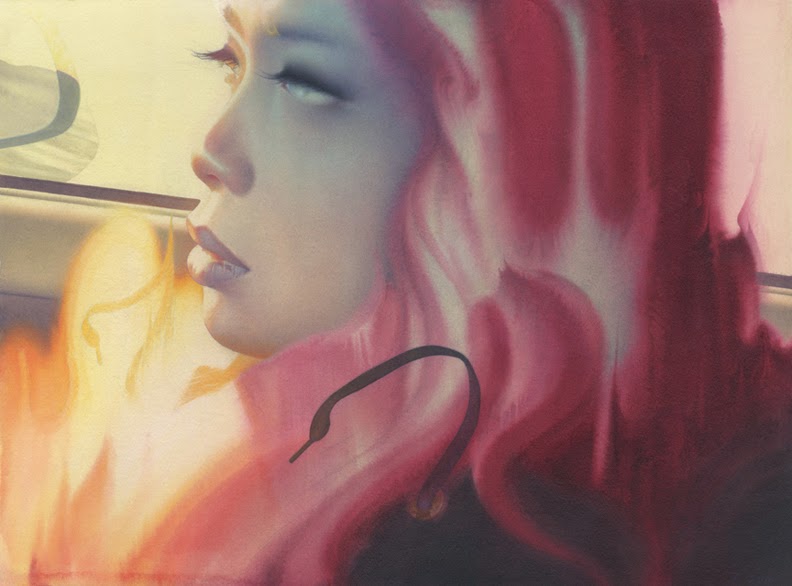 |
| “Driverless” 20 x 15″ acrylic on watercolor paper |
I am interested in art as a means of living a life; not as a means of making a living.”~Robert Henri
This is my favorite quote about art. I hope it becomes more apparent why by the end of this post.
Does it make sense that most cars spend 90% of their time in parking lots? Cars aren’t cheap and it’s kind of a shame they’re not being utilized more. What if cars didn’t spend 90% of their time in parking lots? What if they spent 90% of their time driving around, picking up and dropping off people continuously? With automated, driverless cars this makes lots of sense. However, what does this mean for car sales and ownership? If you can basically get access to a car whenever you need it, would you still want to own your own car? Would these fleets of automated cars be like a publicly owned transport system? Would you miss paying insurance, gas, oil changes, and other forms of continuous maintenance, and waste time looking for parking spots for a car that you use only 10% of the time? Most importantly, what does not owning a really expensive car and sharing automated vehicles instead say about your penis size?
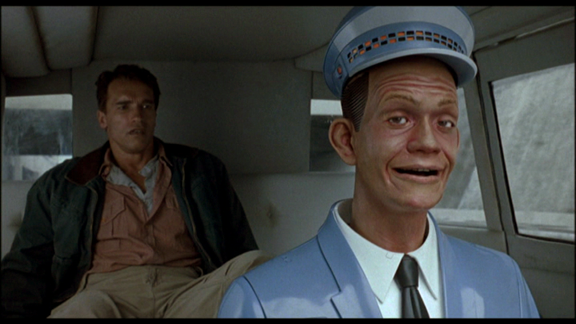 |
| “Yeah, if you could take me to the chopper pronto that would be great. Mmm k, thanks.” |
“You may remember Larry Burns the number two at General Motors, for many years the Vice President of New Car Development. He’s now at the University of Michigan. He did an amazing study. Ann Arbor is a pretty big sized city and he found that even today with the rudimentary Internet of Things platform: communication, energy, logistics internet, in Ann Arbor you could get the same convenience and mobility moving from ownership to access using 80% fewer vehicles right now.”
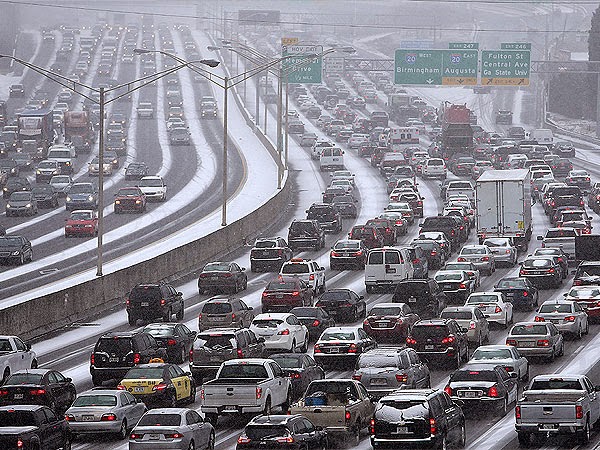 |
| Let’s be honest. Somewhere deep down inside, you would miss this. |
“It’s in the second half of the chessboard that that constant doubling yields numbers so big that our intuition falls apart, that prior experience falls apart.
So when we were writing our book, we did just a quick back-of-the-envelope calculation. The U.S. started tracking computers as an investment category in 1958, and the standard period for doubling of computer power is 18 months. You do a little bit of math, and that quick estimate tells you that we entered the second half of the chessboard in about 2006 with computers, which helps me understand why we’ve got Google cars and Siri and Watson and all these robots coming at us just in the past few years. If this analogy holds up at all, the only real conclusion is we ain’t seen nothing yet.”
~ Andrew McAfee, author of “Race Against the Machine“ on NPR
2006, that was 8 years ago, and 2015 is right around the corner. It’s been almost two years since I wrote that last post, so what’s happened since then? Well, earlier in 2014 researchers at Oxford came out with a Report stating that
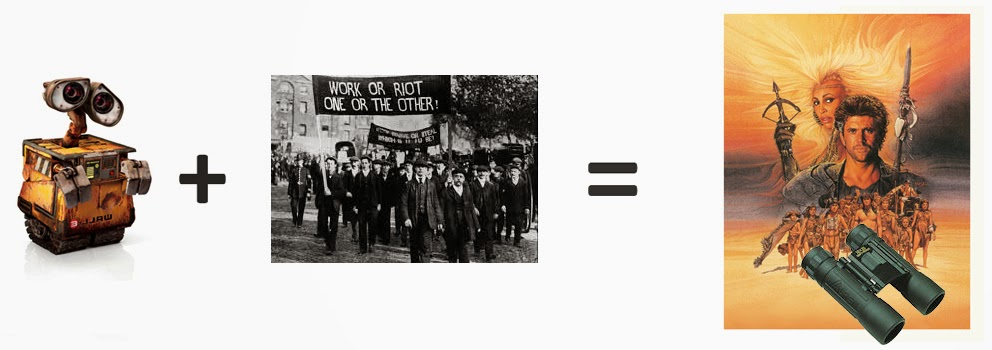 |
| Factoid. “Mad Max Beyond Thunderdome” was Richard Amsel’s last film poster illustration. Click the hyperlink for an excellent reproduction of this piece online. |
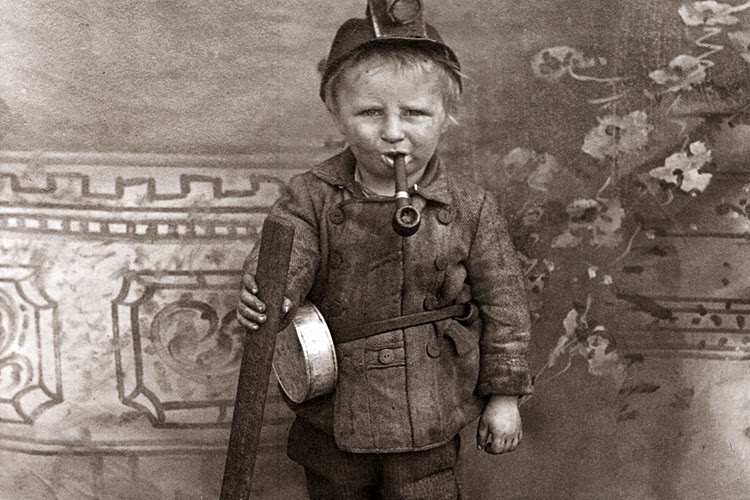 |
| “What a relief! Those 16 hour days were busting my yet to drop balls. I can finally relax with a nice 14 hour day of work. Ahhh, being a 5 year old is awesome.” |
”Three-hour shifts or a fifteen-hour week may put off the problem for a great while. For three hours a day is quite enough to satisfy the old Adam in most of us!”
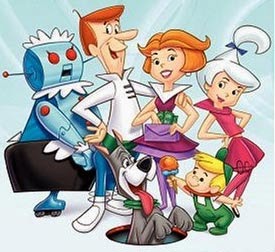 |
| In “The Jetsons” George Jetson actually worked a three hour day and for three days a week. Should we be taking notes? Where did we go wrong? |
More and more modern day economists seem to be admitting that Keynes was most likely right in his prediction but was off by some years. It’s more a matter of when it will happen than if it will happen. Here’s what some other people who study this are saying:
(seriously though, I’m sure we can find something to smash)
So, how might you do that?
-Spread the benefit of productivity increases to everyone.
-Break the concentration of wealth
-Increase pay for everybody
-Reduce the work week, you would say ‘hey, this 40 hour work week, we’ve had it forever. Let’s make it 35, then 30, then 20 til we’re all on perpetual vacation’.”
~MarshallBrain, formerly taught in the computer science department at NCSU, and founder of How Stuff Works speaking at Singularity Summit.
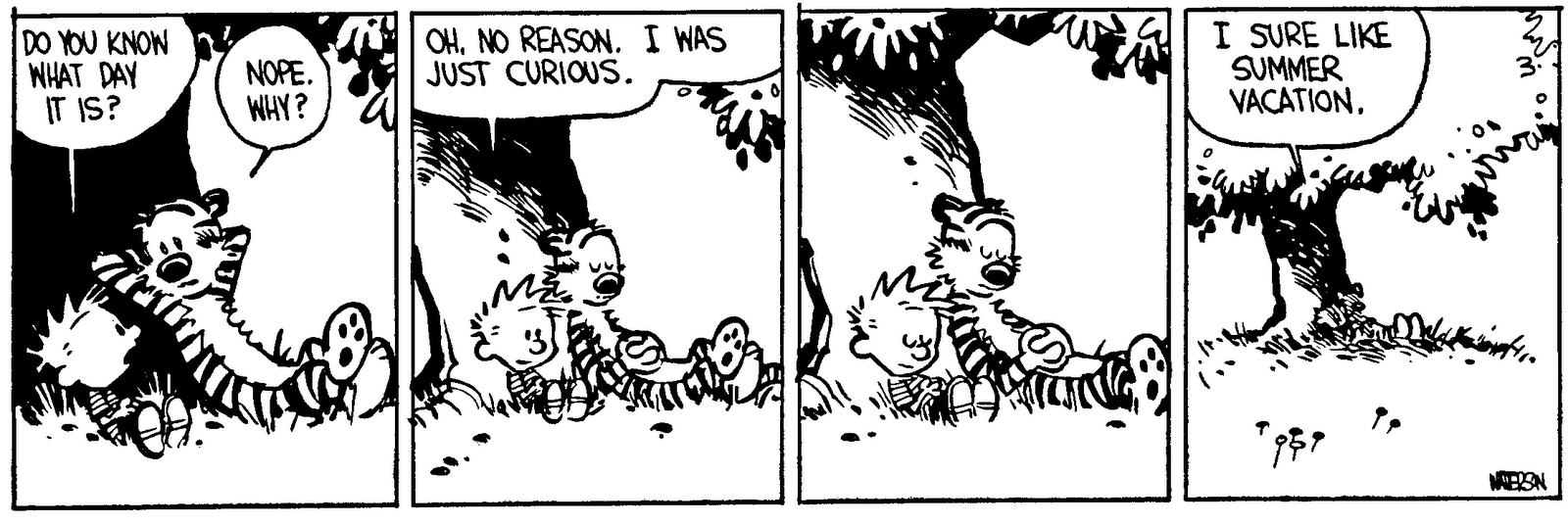 |
| Perpetual vacation?! That sounds…horrible ish. Must…smash…robots… |
So besides reducing work hours to spread around the remaining yet to be automated work load what other options are there? Here’s what some are saying (I know, I’m a quote whore but it’s really much less impressive if someone were to say “Hey, Eric Fortune said this thing.” If this ever happens you have my permission to smack this person. But get their consent first and have a safe word. Always have a safe word.)
~Robert Reich, former Secretary of Labor and star of the new documentary “Inequality for All“
~Martin Ford, author of “Lights in the Tunnel”
~Lord Robert Skidelsky, Emeritus Professor of Political Economy at the University of Warwick
“I used to be one of those people before I did the research for this book, I thought if you gave people a Guaranteed Income that they would spend it foolishly, they wouldn’t work, but then I went through, I looked at a whole bunch of studies that have been done and the evidence is overwhelming that that’s just not true. When people are given a Guaranteed Income the costs decrease on health care, the drop in crime, and most shockingly the increase in productivity. When people are given a Guaranteed Income they actually increase their wealth creation.”
On this point I happen to agree with Molly Crabapple not to mention what the research is showing us. It seems like a UBI would go a long way in assisting independent artists with time to work on their craft and to establish themselves, or at the very least, we could do away with the “starving artist” cliché, and perhaps more importantly do away with people starving in general.
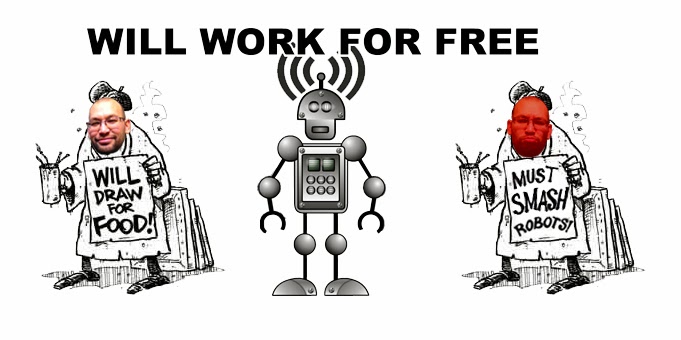 |
| I’m often asked why I choose to paint traditionally when my photoshop skills are off the chain. I don’t have an answer for this question. |
There’s something I found rather interesting about this annual amount of income that has to do with the level of happiness in correlation to the amount of money one makes.“I put this in the context of the Easterlin Paradox, for the audience, The Easterlin Paradox is, it was noted that between 1974 and 2004 U.S. average income doubled but our average level of happiness did not. There have been various different studies and I thought ‘the Swiss picked $33,000’ and as you know, cause you’ve written about it, there’s what’s called the “Bliss Point”, somewhere between $30-33,000 is the optimum amount. If you go below that, if you’re less than that, your happiness increases in about direct proportion to about $30-33,000 and above that your happiness still increases but not so fast and the satiation point is $70,000, above that it doesn’t matter, it’s just not worth having that money.“


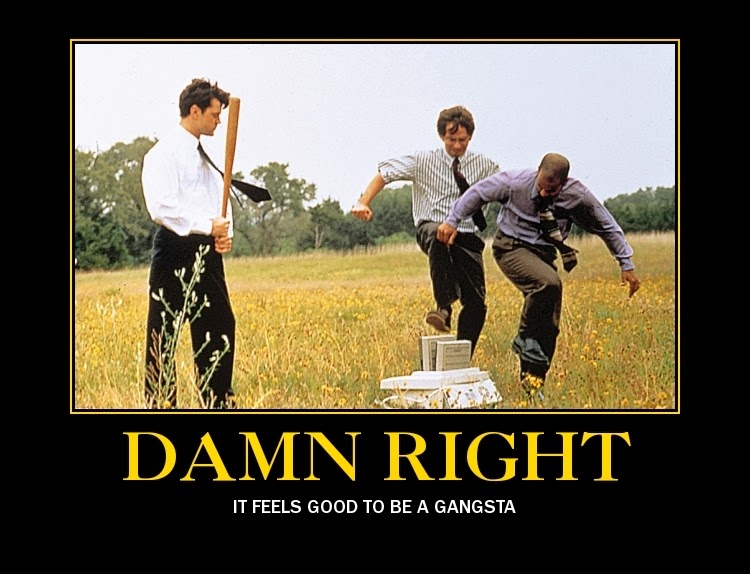
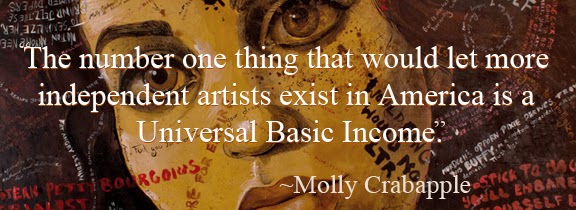
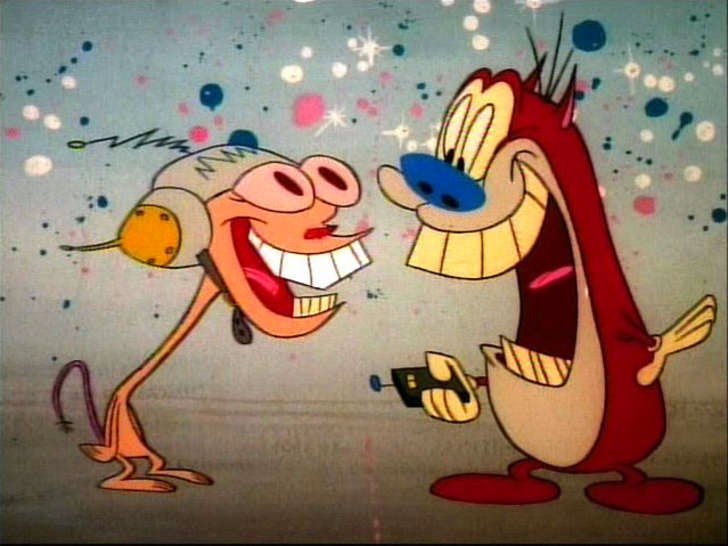
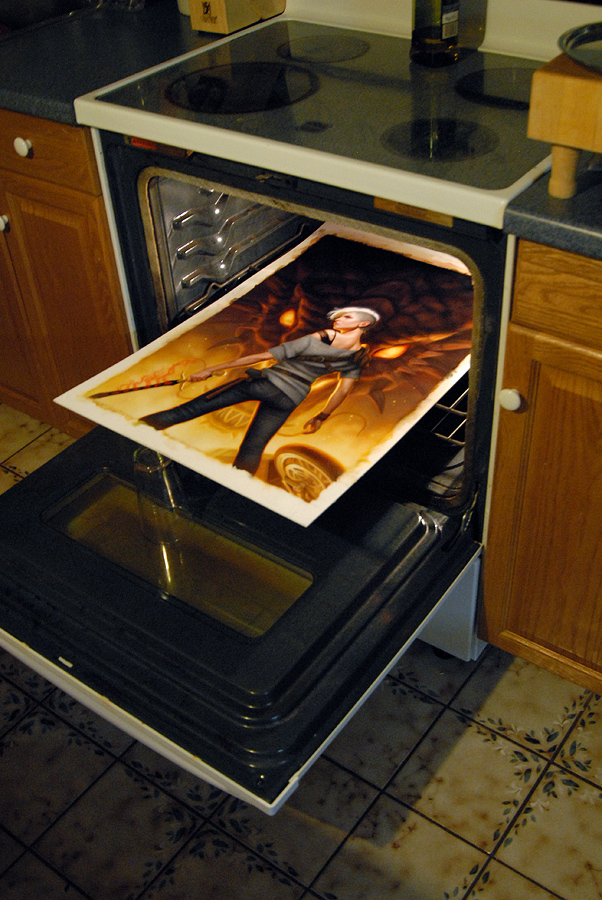
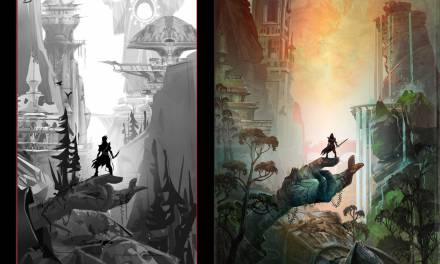
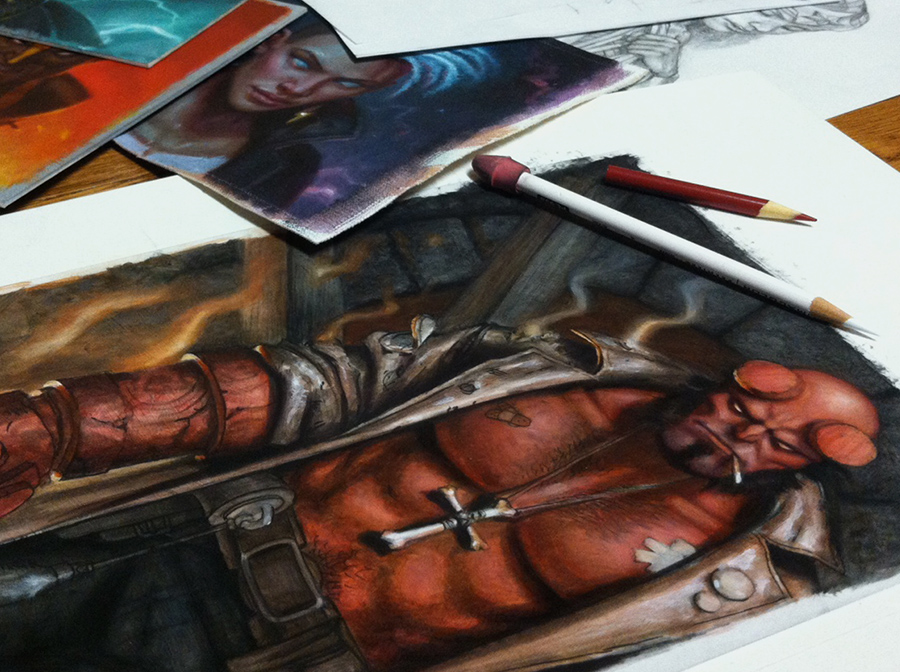
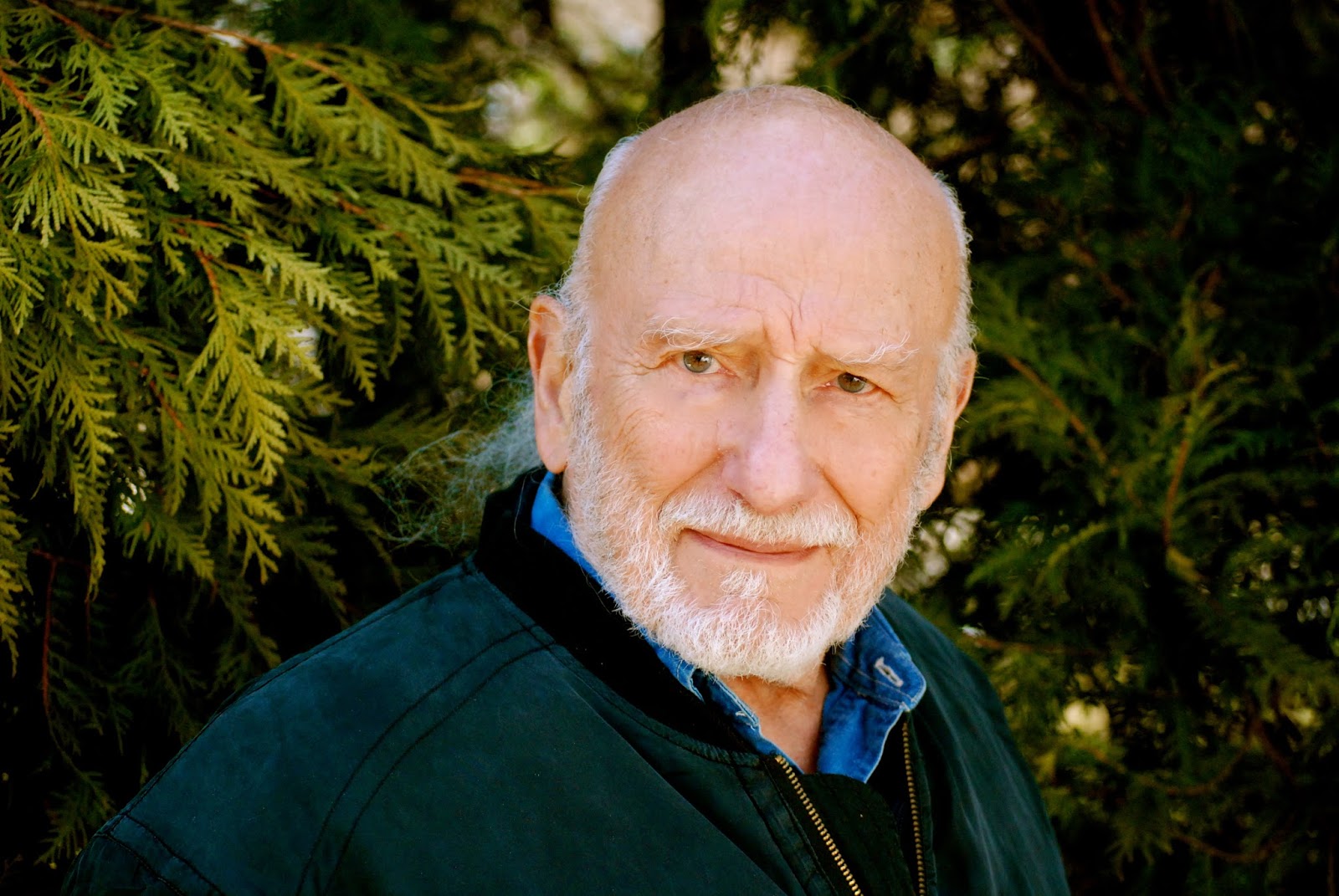
Brilliant post Eric! Thanks for putting in so much to ponder. At a time when I am considering working less, for less money, this is all very relevant and timely.
I hate to be the naysayer, but this seems a little imbalanced between political and art-relevant for what we usually see from MuddyColors. Most artists can use a personal piece as a launching point to talk about their beliefs that inspired it, but how much of this was directly about art?
I think the writer needs to read history lessons when not perusing Keynes… The “everybody is equal thing” was tried at Jamestown in this country, but competitiveness and capitalism generated a higher standard of living in later settlements… who made more money during the depression? the pulp artists or the folks that painted posters for the government? The “filthy” rich will buy paintings and illustrations as well as pay the musicians… I say “thanks” to the rich father that pays me to paint a portrait or play for his daughter's wedding…
This is a great post Eric and an important social conversation that people need to start engaging in, because understanding exponential growth patterns are not a strong suit of our species. I don't think people are ready at all for just how fast exponential growth in AI is going to rip past us on a whole host of fronts.
The Lilly Pond story is one of the best examples of issues related to exponential growth I've come across. From Wikipedia:
French children are told a story in which they imagine having a pond with water lily leaves floating on the surface. The lily population doubles in size every day and if left unchecked will smother the pond in 30 days, killing all the other living things in the water. Day after day the plant seems small and so it is decided to leave it to grow until it half-covers the pond, before cutting it back. They are then asked on what day half-coverage will occur. This is revealed to be the 29th day, and then there will be just one day to save the pond.
So basically if the Lillie leaves double every single day for 30 days it's only half full the day before it's covered entirely, and only a quarter full the day before that. Not enough people are thinking – “Hey, is it the 29th?. If so, what do we do?”
In terms of how this massive shift in society is going to play out in the art world; well it's really hard to say. It makes me think about how artists were one of the first professions to be displaced by technological advancement with the invention of photography, which lead to one of the most explosively creative periods in the development of Western Art. Thinking optimistically; we may see something just as culturally significant via the indirect consequences of AI advancement. I mean, you have to wonder what it's going to be like when advanced AI develops a sense of aesthetics and just how are we going to interact with that?
Who knows though; maybe artists will just wind up making a good living painting portraits of robots because they find us artsy upright hairless monkeys adorable. 😉
Let's not forget this UBI has to come from somewhere, and guess where that is? The taxpaying public. Seems to me that if you want to live off the UBI making art, then it is only fair that said art rightfully belongs to those that paid for it. 😉
That being said, this post is only marginally about art, and more of a veiled political statement. While what you have to say is interesting, this might not be the right forum for it.
Echoing what other people have said, this is an odd choice for Muddy Colors. The post title is spot-on, however, which I get into at the end of my two cents below…
I read through the post, and two thoughts immediately came to mind:
Number one, work, while hard and difficult, gives people motivation and confidence: you work a job, you earn money, you make a living, you support your nation, you learn how to prosper. Seems like a fair deal.
Number two, I see Universal Basic Income setting a precedent that goes something like “Doesn't matter if you work or not, here's your living money”. While it could help disadvantaged people, it also could foster a mentality that you don’t have to work to live the good life (or any life, really). A nation of people who don’t want to work to live won’t last long, produce anything good, or do any good for the nation or the people in it.
Number three, both the above points I trace back to the question of what kind of life people *should* live, the really big and thorny question (and which is why “Driverless” is an excellent title for this post). I enjoy my leisure time. I don’t like the fact that work is difficult. And yet that question remains…once everybody has leisure time, once all the economic difficulties have been solved, what do you do then? What should the mind and soul aspire to once the body is comfortable?
Maybe art can help with that question. I hope and believe it can.
While I don't really want to engage in too political a discussion, and this is a bit off topic, but I do always think its interesting that professionals in the arts tend to have this mindset. It seems directly contradictory to their realty…where the hardest working/studying/skilled individuals get the highest payout in the form of a successful arts career. Anyone who is willing to put in the time and discipline can get good, but there will always be people who rise to the very top and their work merits it, in the eyes of their peers. I've never heard a successful professional artist suggest that their rates be normalized so that amateurs in the field can get an equal income as themselves…but I do hear artists suggest it about every body else's fields. I'm not trying to state an opinion here though- I just think its a strange contradiction. I'd love to hear someone rationally explain it to me, even if I might not agree I'd like the insight.
Sarah, This is a great question, one I hope I can help with.
You claim that “the hardest working/studying/skilled individual gets the highest payout” And while there are many very successful talented artist out there, one can also look at “artist” like Thomas Kinkade, or Jeff Koons and disagree, both these artist made a very successful living off producing kitsch art, that they in the end did not even create with their own hands, but would hire (at unprecedentedly low wages I might add) other aspiring artist to create the actual work and then would sign it at the end.
The belief that if you put the time and effort in you WILL be a successful artist is a fallacy, we don't live in a society that allows for someone to explore their own passion, and produce work that they want to, we live in a society that requires you to make a profit to survive. It seems like this idea then caters to the “if it doesn't sell then it's not good” state of mind. But then historically we argue that Van gogh was a failure as an artist, except for now his work sells at the highest level. I personally don't want to live in poverty my whole life, and then have my work recognized and become famous later, that's not WHY I'm an artist.
This may differ from artist to artist as well, I certainly know many artist who just love to paint, but I'm adding to this mix, performers, writers, singers and any other individual who pursues their passion. These people create, but usually when you look at their creations they are an extension of a bigger passion. That passion may be animals, their heritage, women's right's ect.
These creators are not in it for the money. The create because it is important for them, and they wish to communicate it to the public. You are looking at being an artist as a job, when most artist see it as a lifetime pursuit, and if they get paid, that's great, but many artist who don't get paid still keep on producing. The problem is they have to get a part time job as a sales clerk, or work at Walmart, so they can just barely feed themselves, which takes away from their ability to work on their passions. You might not see this as a problem, you might argue it's their own fault for not conforming to society rules about having to work a job like everyone else, but I do.
…response continued on post 2
… response continuted
I find it very upsetting that I HAVE to sell my talent's out to the “filthy” rich father who wants a painting of his daughter done. When I'd rather my time be spent on Illustrating a story to children about why collaboration in life is a powerful and helpful thing. This kind of mindset to me feels dirty, It feels like the trickle down effect. And while I'll not get too much into it, I personally do not feel helps society in any way.
As for the artists who do not talk about normalizing their own wages, this is not what a Universal Basic Income (UBI) is. The UBI does not equalize income across the board, it is basic income provided for every individual so that they have the OPTION to work a conventional job, or they have an option to pursue other passions, which may bring them profit or may not. The UBI is there so that no matter what, an individual has access to the most basic of needs, which within a 1st world society should be easily attainable because of our excess of production. It's like the irony that we currently have more empty houses than we do homeless people.
I also want to stress here that a UBI does not replace your paycheck if you do so choose to work for a company, or sell something, it simply creates a buffer, for it you're fired or a disaster happens in your life that you didn't plan for.
There are many other factors here as to why a UBI would be beneficial to the American people, and I continue to educate myself on the matter because I still do not feel I fully know the benefits and cost that would arise from this possible future. But currently from the research I've done it seems like a much more appealing reality than the one we currently live in. No because I can sit on my ass all day and play video games, but because I'll have the stability and security of knowing that I can experiment, fail, research, and practice my art and my passions without the risk of going hungry or homeless.
I hope my response helped, if you have any questions I'll answer them to the best of my ability.
I agree. Cars certainly have a long way to go to really be the advanced things our ancestors dreamed of. However, that doesn't mean we cannot go there now, or take it one step further into the future through grafts and augmentations that we can avail of at the current time. Thanks for sharing such an informative read! All the best!
Bradford Oliver @ Lacustoms
Artists thrive under capitalism, in the least likely of ways.
I was on a forum chatting to a full-time artist in Europe a few months back. She was telling me how she never feels like sculpting, and doesn't get enough done to have an impressive portfolio.
I said, “I have to sculpt and paint, if I want to eat.”
She was astounded by that. She said she didn't 'get' the U.S. She said her country provides food and housing for her, and she doesn't have to worry about any of that 'nonsense'.
Well.
My electric is usually on the verge of being turned off.
I've hobbled my horses and turned them loose on the range, some days, because I couldn't afford hay.
I've missed meals.
My clothes have holes in them.
My truck is broke, and I can't afford to fix it.
I'm always behind on my mortgage.
But you know what?
I make beautiful feline art. Every week. 10-16 hours a day, 6-7 days a week. Because I HAVE to. And because my portfolio is ever-growing, I'm getting better known, and getting paid more for my work. Someday, all my bills will be paid up, and perhaps I'll start having some weekends off to ride the horses or play Assassin's Creed. I'll be living the dream, making a 'normal' living off my art. Perhaps with money left over to watch a movie or eat out every now and then.
All because no one was there to catch me if I fell.
That I wish I had gotten to see even more of the art that went along with it. I think there are plently of contributors on muddy colors to make sure the atsy topics are always covered. Besides, throughout history artists have always been connected with creating movements rooted in real life and often times are progressive and ahead of the times. It's one thing that a lot of people say makes great art!
Hmmm seems my previous comment did my make it…I'll try to recreate it……
I like the political topic a lot. I spend more time reading news than I do reading art blogs. There is art accompanying the post and it was a slight deviation but very well thought out and it's obviously something you have a passion for. I will say however…
Great post and thanks for writing it, Eric!
For all who want to learn more about basic income, there's way more to learn and discuss on Reddit: http://www.reddit.com/r/BasicIncome/.
Great post Eric,
Always love hearing about this stuff. If for no other reason than the first quote you shared “I am interested in art as a means of living a life; not as a means of making a living”, I hope that people can embrace some of these ideas. I wish it wasn't normal to work under the fear of starvation or poverty and that people didn't believe that their interests and curiosities would die if they were provided a basic income…
Sounds like a universal basic income would really have helped you through these tough times. I hope other struggling artists in the future do not have to stress or give up so much for their passion. I wish you well and admire your convictions 🙂
Hmm, seems like you would love to have meals any time you want to, clean clothes and dresses without holes in them, a working truck (self driving ideally, so you could sketch instead of wasting your time behind the wheel), and also, be able to live without worrying too much about the mortgage. That's what UBI enables you to do. To be at peace, to be comfortable. Do you really think that without all the pressure that our capitalistic society puts on you, you wouldn't creat beautiful feline art? I highly doubt that. You would do it, and you would do it better.
I think you're wrong on the assertion that artists were displaced because of photography. As far as I know, people still painted realistically and survived, during this period. They were the first illustrators, so to speak.
UBI would come from the revenue caused by the increased production that automation would bring into the table. That's why right now, since automation isn't there yet, it can't happen. And why are you so afraid of taxpaying public? The most egalatarian countries in the world have the highest taxes. It's not because the big ol' guvment is evil and stepping on their toes. It is sad that so many artists are so afraid thinking outside of their artistic bubble. The world is bigger than your art. I'm glad an artist as creative and talented as Eric has the balls to be able to talk about this stuff. You people need to start thinking about your futures, because this is going to come wether you like it or not. The people need to steer the coming changes towards the benefit of all, not the few.
It's a good thing that your uninformed opinions on what an UBI does to a society are just that: baseless opinions. Go and read some of the studies that Eric took the trouble to link up in his post. They explain why your assumptions on UBI are wrong (with studies and statistical facts of course, not hearsay). Regarding your last point, well, what would you do if you didn't have to work? You could do lots of things, just like your normal life. But you wouldn't have to stress out if something doesn't work out.
I think you missed the point of his article. It's not so political, it's more about the life as an artist in the near future, where rapid advancements in technology are going to leave a lot of people jobless. Can this become a good thing for society, or not? And if you are going to keep insisting on the political nature of the post, then I think you should view the ideas showed here, specially UBI, as neither left, nor right leaning, but FORWARD leaning. UBI across the world would mean an instant elimination of poverty, and quite possibly an elimination to crime. Combined with self driving cars and other tech, well, it just means our immediate future looks really positive.
Great post Eric. I have been lucky enough to have lived under some sort of UBI for the past year and a half (a full time scholarship to study an MFA in Illustration at SVA in NYC, provided by the government of my home country, including tuition and living expenses), and what I can say, it's a pretty much ideal situation. But it doesn't work if only a few have it. & the money provided to live barely scrapes buy in this expensive city, but that's capitalism for you and all that in brings (gentrification, rising living costs, etc). In my case, my scholarship ends once I get my MFA at the end of this semester, and it's back to good ol' fashion capitalism and breaking your back. I wish someday the whole world would get to feel to have this sort of UBI in their lives, in a permanent fashion. In my case it let me concentrate on my stuides and exploration of illustration, without having to worry about working. Who wouldn't want that?
Francisco, my style of art is work. Much of it involves sitting there and painting/sculpting individual hairs hour after hour, day after day. I LOVE some moments of making my art. And I almost always feel triumphant when it's done. But I'm not propelled by some magical artsy fartsy rainbow-colored force some people seem to think drives artists. Without pressure, I'm ashamed to say I wouldn't make much art. Instead, I'd sit around on art forums and talk about making art, like my government-supported friends do. In fact, I used to do just that when I had a regular day job.